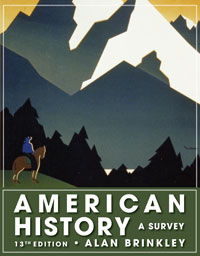American History: A Survey (Brinkley), 13th EditionChapter 11:
COTTON, SLAVERY, AND THE OLD SOUTH Main themes of Chapter Eleven: - The effect of short-staple cotton's rise on the economic development of the South, and the impact this enthroning of "King Cotton" had on subsequent Southern social and political development
- The class and gender dynamics of Southern white society, in both myth and reality
- The character of the different varieties of the South's "peculiar institution," and African-Americans' various forms of resistance to it
- The separate culture of African-American slavery, and how it manifested itself in religion, music, language, and family life
A thorough study of Chapter Eleven should enable the student to understand the following:- The expansion of short-staple cotton throughout the South, and the role it played in shaping the "Southern way of life"
- The workings of trade and industry under the Southern agricultural system
- The structure and founding myths of Southern plantation society, and the role enslaved people played in that society
- The cultural and political practices and beliefs of the non-elite, non-slaveholding white population
- The forms of active and passive resistance African-Americans engaged in to combat slavery in the South
- The culture of African-American slavery, as expressed through religion, music, language, and family life
- The continuing historical debate over the South, its "peculiar institution," and the effects of enslavement on the blacks
 | 




